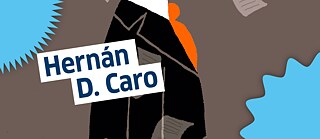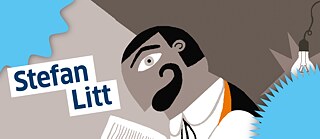Zeitgeister On Air Being Kafka #8 with Grzegorz Jankowicz

Dina Elsayed’s guest on the Kafka-Podcast is Polish philosopher and translator Grzegorz Jankowicz. Grzegorz hosts a reading circle in Kraków under the banner “How to survive with Kafka”, in which participants work as a group to navigate the disorientating words of Franz Kafka. His tip for anyone reading Kafka for the first time: relax, forget about the clichés, and have fun. And we hope you have fun listening to this episode too!
Transcript
Dina Elsayed: [MUSIC PLAYING] Welcome to Being Kafka, the second season of ZEITGEISTER ON AIR by Goethe-Institut and Common Ground Berlin. I’m your host, Dina Elsayed. These past months, we’ve been honouring Franz Kafka’s legacy 100 years after his death. And we’ve been exploring how his works are still relevant to us in 2024. You can find more insights at goethe.de/kafka. And today, in our final episode, we discuss the keys to understanding Kafka’s writings with Grzegorz Jankowicz, a Polish philosopher of literature, a critic, and a translator. He’s also an editor at the weekly Tygodnik Powszechny and the director of the Conrad Festival. He joined me from Kraków via Zoom right after having participated in 11 literary events across five cities. Grzegorz, when and how did you first come across Franz Kafka and what was your initial impression at the time?
Grzegorz Jankowicz: My first encounter with Kafka was in theatre and through theatre. As a student, as a teenager, I was taken to the theatre by my teacher with other classmates. And I watched a performance based on America. At that point, I didn’t have the same experiences as Karl Rossman had, the main character. I was only 14 – he is 16 in the novel. I was not expelled from home – he was. I was not seduced by a maid and I didn’t have a son. But his experience of being thrown into the world, where he has to cut out his own path, that particular experience was very important for me. I felt like Karl has something in his experience that I also carry on my shoulders. So I had a feeling that I understand absolutely everything. You know, the scenography of this play was absolutely amazing. The actors were fantastic. I understood all the exchanges between them. So the first encounter was very good. Only later, I started to read Kafka. And I have to tell you that this feeling of obviousness was still with me. Of course, I know that many people find his works hermetic. And it is possible to read them as such. But it’s also possible to treat him as a writer who gives us something that is complete. I don’t think that Kafka hides anything from us. There is this famous anecdote about him writing a short story called The Judgment. It took him a few hours to compose the text. And in the morning, he was absolutely certain that it was a kind of epiphany. It was a constant flow of writing. Every image he took out of his imagination, every concept that came from the language itself was just right. So he understood everything. A few months later, in a letter to Felice Bauer, he said that this story actually is totally hermetic to him. And he asked her: “Can you understand anything out of it?” So we have two positions, two perspectives, two attitudes of the writer himself. First, everything is obvious. Second, everything is hermetic. And we can also choose these two ways of reading him. The famous line written by Theodor Adorno, that Kafka’s texts are parables, but we lost keys to them to understand them – sounds good, sounds nice, but it’s extremely destructive for our reading experience. It transforms Kafka’s works into sacred texts. And it takes this writer out of our daily reading experience. While I think that we should put him in the very centre, in the very core of our reading experience, eliminating this distance. It doesn’t mean that he will be interpreted by us in one way when we take him closer. Of course not. So my first encounter with Kafka was, as I said, and the conviction that we can read Kafka and use him for our own existential experience has stayed with me until this day.
Dina Elsayed: What was it that made what you watched, what you heard, at the theatre when you were a 14-year-old, resonate with you?
Grzegorz Jankowicz: You know, I felt that the stake of the story is whom should we choose as the closest human being on earth – with whom we should stay, where we should dwell. That was the first impression when I watched the performance. And then later, it was even stronger when I read the book. In the first chapter, we see Karl Rossman arriving to New York’s harbour on a ship. And all of a sudden he remembers that he lost his umbrella. So he leaves his luggage with an unknown person, a person he has just met. It’s a very strange thing to do, you know, to leave all your belongings with someone whom you should not trust. But that’s what he does. And he goes under the ship’s deck to look for his umbrella. And immediately, he feels lost in the labyrinth of stairs and corridors. And because he’s agitated, because he is moved, he starts to heavily knock on the first doors he encounters. And there inside is the stoker, the first person he actually talks to deeply in this novel. And quickly, Karl has this impression, this feeling, that the stoker can be a friend for life, can be a proper human being for him. But he has to decide whether to stay or go further. I’m sure that you know this strange, funny game played on electric stairs [escalator]. You are in the mall, electric stairs [escalator] take you up, and there are people going down next to you. And you have to decide. In your imaginary – this is only imaginary exercise – you have to decide with whom you should stay with. If you decide too early, the person may be wrong, because maybe the next one could be better. It sounds cruel, but that’s the rule of the game. If you decide too late, you may end up with someone who is worse than the person you met before. As much as it is cruel, that’s what we actually do on an everyday basis. And Kafka throws his character into that kind of situations. Sometimes Karl has to decide. Of course, this is very difficult for him, because he is too young, he is not mature enough, he lacks experience, but he must decide for himself. Sometimes the world is just against him, but this is the main…as I understood it then…stake of the whole book. So it somehow resonated in me and with me. I felt that Kafka actually treats me in a very serious way. He does not pretend that my choices will be easy, that this task to choose is easy. It’s very difficult, it’s absolutely, overwhelmingly cruel at times, but still I must do it. And Karl must do it.
Dina Elsayed: Would you say that America is your favourite work by Kafka?
Grzegorz Jankowicz: No, no, no, no, no, no, no, not at all. I can give you that kind of stories, interpretive stories about many other of his texts. No, no, no, I just, you know…the first encounter was with America.
Dina Elsayed: What would you say is your favourite work by Franz Kafka?
Grzegorz Jankowicz: Oh, I wouldn’t be able to answer this question. I mean, every single day I would choose something else. Today in the evening I will conduct my workshops on Kafka – these are open meetings of a group of people, and we just collectively interpret his texts. And we are going to talk about The Hunter Gracchus, which I absolutely admire. Do you want me to tell you why?
Dina Elsayed: Please do.
Grzegorz Jankowicz: [Laughs] Well, usually we feel like there is a point in the future at which we must arrive. We have a certain goal and everything we do now will lead us to this place, to this point in time. So we treat our life, our current life, our current exercises, our current obligations as sort of a rehearsal. The main performance will be later. Now we are just practicing. Now we are just preparing ourselves. Kafka destroys completely this attitude. The hunter Gracchus died, but cannot end his life. He cannot arrive to the underworld. He cannot arrive to the place of death. So he must move constantly around the world. If we read this story allegorically, if we do not take for granted that he is dead, we can actually cast some light upon our own experience. No, it’s not the goal that is in the future, what is important. It’s not a rehearsal. We are actually having this endless journey through life. I mean, it will end eventually – but not by our choice, not at the moment we choose that we just achieved everything we wanted to achieve. Of course, this image of life as something that leads to a certain point is based on our, for example, religious image of time, like people that treat Christianity as their religion, they have a very particular sense of time. They start at a certain point and they go to a certain point after crossing this point, which is death. They will just go to a better world where everything will be saved, so to say. And they use this image of transcendence in their daily life, which for Kafka, it makes no sense. We’ll just have what we have now. There is possible what is possible and nothing else is possible.
Dina Elsayed: I want to talk more about these workshops where you focus on Kafka’s works. Does Kafka work well in such an interactive format or are people uncomfortable talking about some of the strange themes he employed in his works?
Grzegorz Jankowicz: The series has its own title. It’s “How to survive with Kafka.” And it has two possible meanings. One: How to survive with him, with this particular gentleman who was brilliant, was intelligent, was extremely talented, but extremely peculiar. So is it possible to be with such a man, to live with such a man, to have this man as a soulmate, let’s say? The other meaning is how to survive thanks to him. How can we use his works as tools in our daily life? Of course, someone would say, “Oh, that’s not a proper interpretation. The proper interpretation is only possible when you utilize academic procedures of interpretation.” Well, sure, you can do it academically – I choose a different way. I just talk to people about Kafka. And of course, I did everything that is possible to obtain proper knowledge about this writer, reading hundreds, thousands of books about him. But I am not interested in reading him academically. I’m interested in initiating a process of collective interpretation through which, by supporting each other, we find something in the text that resonates in us and with us. This is what we do during these workshops. Each workshop has its own title. The general title is “How to survive with Kafka.” But the particular titles are, for example, “How to laugh and smile with Kafka”, or “How to fight against a bad power/bad government with Kafka’s texts”, or “How to ride a bike with Kafka.”
Dina Elsayed: Amazing. We’re not alone in this. And to be able to find yourself in a room and connect with people over such, quote, unquote, “strange themes,” I find that very consoling, in a way.
Grzegorz Jankowicz: But look, we just treat him as an author of surreal stories, an author of unrealistic concepts. But how so? Just try to analyse your thoughts for one hour per day and just write down everything that comes to you and just compare it to Kafka’s text. It will be more awkward than anything else. Our imagination, our consciousness, everything that goes through our minds is very peculiar. It’s strange in a very positive way. The imagination works like this. It transforms our experiences into something else. We were told that only pure and logical sentences make sense to others. But Kafka rejects that notion. And he presents something that is, to me, it’s not surreal. It’s more realistic than anything else. So yeah, I’ve never treated him as someone that is distant from everyday life – actually, quite the contrary. I feel that every single step he made with his writings and in his writing was actually based on his experiences. He tried to understand them. He tried to grasp them. He tried to do something out of them. And the first thing that came out was a story.
Dina Elsayed: Yeah, I keep nodding because all of these sounds like very, very universal experiences to me.
Grzegorz Jankowicz: Exactly, and you can find these descriptions of these experiences in Kafka. You can find ways out of these situations. Of course, Kafka is not someone who gives you a lot of hope, but it’s not the hope that you need. It’s the tools, that will let you out, you need the most. And it’s there. The analytics Kafka prepares from us, the analytics of these micro economies of violence is so insightful that it will give you a lot of agency.
Dina Elsayed: I came across an article written by you in Polish and I had to use Google Translate to understand what the article was about and it posed the question, “Who does Kafka belong to?” Can you tell me a little bit more about that?
Grzegorz Jankowicz: It’s a very good question. It’s one of the most important questions we could ask about Kafka. I think that he belongs to here. What does it mean? I’m talking to you from Kraków, one of the hearts of the Austrian-Hungarian Empire, along with Lviv, Prague, Vienna, or Budapest. Kafka hated this place, but at the same time, he was born here and he was, so to say, crafted here. He inhaled this cultural structure and it determined his writings. I don’t know if you are familiar with this book by Claudio Magris, a good friend of Conrad Festival I ran in Kraków. The book is called The Habsburg Myth. At a certain point, he writes about three writers born in Prague – Rainer Maria Rilke, Franz Kafka, and Franz Werfel. All of them wrote in German, but their German was different than the German used in Vienna at the time or in Berlin – why? Well, first of all, Prague at that moment was a symbol of the Habsburg Empire, a symbol of its crisis. If we went to the past now, let’s say 120 years ago, and we take a walk through the streets of Prague, we would see buildings, old buildings, a little bit crushed. We would see neglected places, neglected parks, for example. All of it was a sign of presence – presence of what? Of the past. This is exactly the cultural and geographical, political, and economic milieu in which Kafka was born and raised. It determined his works. It determined the works of Rilke and Werfel. That’s the first thing. The second thing is that all of them were surrounded by other languages. Kafka heard Czech, Hungarian, Slovak, Slovenian, Polish. This mixture of languages made him feel uncomfortable in German – which he used for his communication and for his writing. Of course, he knew Czech very well. He could easily communicate at home and at work in this language, but he was writing in German. And if you check certain meanings, he attached to words in German and compared them to the meanings from dictionaries of his times and dictionaries of our times, you will see a lot of differences. So where did Kafka belong to? To my understanding, he belongs neither to Germany, he doesn’t belong to Israel. You know, this battle over Kafka’s archive. It was outrageous. The battle between Israel, Germany, and the Hoffe family. Benjamin Balint wrote an amazing book about it. Of course, Kafka was Jewish. He knew Jewish tradition through his close friend, Max Brod, or another friend, Jiří Langer, talented interpreter of [the] Kabbalah. So he knew this tradition – he knew Judaism to a certain extent. At a certain point, he fell in love with Jewish theatre played in Yiddish. At other points of his life, he started to learn Hebrew and had this fantasy that he will go to Palestine. All this is true, but it does not mean that he belongs to Jewish culture or to Israel as the concept of the state, not at all. He had nothing to do with this. So to my understanding, he belongs to Prague. There should be an institute financed by [the] European Union where all the writings of Kafka should be kept and should be given to the world. Of course, you know, the argument of Israel that the Hoffe family, Esther Hoffe, made a lot of mistakes was relevant. She made a lot of mistakes. To this day, I do not understand why she let certain scholars work with these papers and she kept others away. It shouldn’t be like that. Kafka belongs to everyone. That doesn’t mean that he should stay…that the papers should be kept in national library in Jerusalem, for example, or elsewhere. It should be kept in Prague where he was born, where he spent most of his life. This institute should be modern and technologically empowered and all scholars from the world and all the readers from the world should go there and just read Kafka whenever they want. That’s my position [laughs].
Dina Elsayed: With regards to languages, do you think there is a difference in experiencing Kafka in different languages?
Grzegorz Jankowicz: Of course, absolutely. Absolutely, yes. You know, yesterday I spoke with Elżbieta Jeleń from Goethe-Institut, Kraków. She participates in the workshops so we talked about one line from The Trial. This is the line from the ending and we have two translations of this novel. One made by Józefina Szelińska, fiancé of Bruno Schulz, amazing writer. And this is an old translation and we have one new translation by Jakub Ekier, a poet, fantastic poet and very good translator. So both translations render this sentence in a very similar way in Polish. But actually, when you analyse the German original, you will see something different. There is a possibility that Kafka understood one word in a different way, not according to the dictionary, but according to his own usage. You know, we have this exchange between him and Milena – Milena Jesenská, who translated him into Czech. Actually, The Stoker was translated by her into Czech. So we know how he experienced this transition between languages. And it’s a very fascinating story. I guess if someone read all Kafka in German, for example, he/she/they should try to just travel to other languages to experience a different Kafka.
Dina Elsayed: I wanted to ask you if someone is about to embark on reading Kafka for the first time, what should they keep in mind?
Grzegorz Jankowicz: Well, first of all, relax. Forget all the clichés and stereotypes about his work. Do not use the term ‘kafkaesque.’ Just cross it out from your language. Just never do it. And just try to find your own way through these stories. Do not be troubled by the sense of being lost when you start reading. Do you know this letter sent by certain Dr Siegfried Wolff to Kafka? This is actually the only letter sent by his reader to him. And the story goes like this: “I bought your Metamorphosis for my wife, but she didn’t get it. She gave the book to her mother, but the mother didn’t get it either. The mother gave it to her cousin, and the cousin did not understand the text. So now all of them approach me because I’m the only doctor in the family. So I’m in the position to understand. I am supposed to understand. So they asked me how to properly read this text. And I do not understand it either. So you must help me, Franz Kafka, because you actually put me into this position!” We do not know what was the reaction of the writer. I imagine him laughing loudly after reading this text. So do not feel obliged to understand anything in a very peculiar way. There is no one interpretation you must follow. Just try to read it, feel it, and have a lot of fun, even if you are scared. Just look for other readers of Kafka. There are plenty! And try to talk about this experience with them. I’m sure that they will be supportive. And a lot of very inspiring thoughts will be produced during such conversations.
Dina Elsayed: I will do that myself. Thanks for the pro-tip. My last question is, if we do zoom in on Poland, how is Kafka relevant to the Polish public today?
Grzegorz Jankowicz: For the last eight years, we had a very conservative government here. It got changed only recently. So I guess a lot of people who would experience…especially women, for example, but also other communities – the LGBTQ Community in Poland – all of them would feel not only neglected, but oppressed. So Kafka would come as a person who understands the dynamics of this oppression, and with some good insights about what to do. Of course, it’s obvious what to do. We have to protest, we have to oppose, we have to fight for the rights that belong to us. But it’s not only what we can do on a collective level. It’s also important how we can empower ourselves individually. And Kafka helps a lot. So that will be the way to read him now in Poland. But it’s just my perspective, it can be limited to my problems, to my emotions, to my biases – I am certainly biased. So what I would recommend would be just to find a different way to this writer. The most important thing always is the question we ask at the beginning. It doesn’t have to be the question provided by scholars. It must be a question that is tremendously important, deeply relevant for ourselves. If we ask this question and then open any text, Kafka’s let’s say, it will just light up in a certain way. And maybe something will happen there. You know, maybe these lights will lead you somewhere.
Dina Elsayed: That was philosopher and critic Grzegorz Jankowicz, and I’m Dina Elsayed, the senior producer of Common Ground Berlin. Thank you for listening to our series, Being Kafka. We hope you will join us for future ZEITGEISTER ON AIR audio interviews.
Host: ZEITGEISTER ON AIR is brought to you by the Goethe-Institut. Thanks to all of our friends and partners for making this series possible. [Music]


